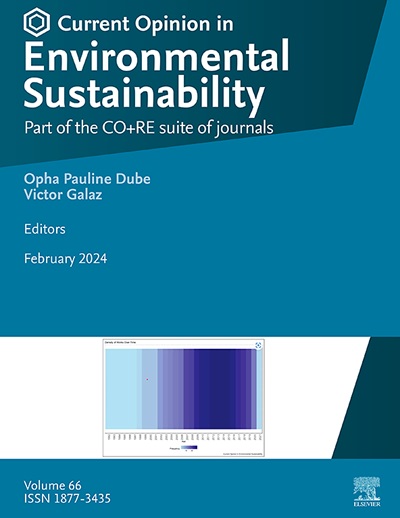循环经济在降低企业违约概率中的作用:来自近期研究的见解
IF 6.3
2区 环境科学与生态学
Q1 ENVIRONMENTAL SCIENCES
Current Opinion in Environmental Sustainability
Pub Date : 2025-06-27
DOI:10.1016/j.cosust.2025.101555
引用次数: 0
摘要
循环经济(CE)实践通过提高资源效率、降低成本和增强企业声誉显著提高财务绩效。通过减少浪费和最大限度地利用资源,公司可以降低成本,提高运营效率,从而直接改善其财务状况。减少排放和资源回收等环保措施不仅降低了生产成本,而且减轻了监管和环境责任,从而直接降低了信贷风险,改善了企业的财务稳定性。在这个框架内,数字技术的集成已经将传统的商业模式转变为更灵活和高效的循环电子商务模式。这些进步促进了实时资源流优化,在全球供应链中有效地扩展了CE实践,从而提高了公司的环境、社会和治理(ESG)绩效,并通过降低违约概率降低了信用风险。此外,政府结构和企业特征(如规模和所有权)显著影响环境行政实践的有效性。中小型企业由于其集中的所有权结构和短期需求,在实施环境行政方面往往面临独特的挑战。然而,强有力的治理框架可以通过确保强有力的资源管理和培养可持续性文化来帮助克服这些障碍。综上所述,通过采用减少浪费、延长产品寿命和闭环供应链等企业环境治理战略,企业可以显著提升其ESG概况,增加投资者信心,降低资金成本。循环性得分高的公司,反映了全面遵守CE原则和良好的ESG表现,与不太可持续的同行相比,违约概率较低。本文章由计算机程序翻译,如有差异,请以英文原文为准。
The role of circular economy in reducing corporate default probability: insights from recent research
Circular economy (CE) practices significantly enhance financial performance by increasing resource efficiency, reducing costs, and bolstering corporate reputation. By reducing waste and maximizing resource use, companies can decrease costs and improve operational efficiency, thus directly enhancing their financial health. CE practices such as emission reduction and resource recycling not only lower production costs but also mitigate regulatory and environmental liabilities, leading to a direct decrease in credit risk and an improvement in corporate financial stability. Within this frame, the integration of digital technologies has transformed traditional business models into more agile and efficient circular e-business models. These advancements facilitate real-time resource flow optimization, scaling CE practices effectively across global supply chains, thereby enhancing companies’ Environmental, Social, and Governance (ESG) performance and reducing their credit risk by lowering default probability. Moreover, government structures and firm characteristics like size and ownership significantly influence the effectiveness of CE practices. Small and Medium-sized Enterprises often face unique challenges in implementing CE due to their concentrated ownership structures and short-term needs. However, strong governance frameworks can help overcome these barriers by ensuring robust resource management and fostering a culture of sustainability. In conclusion, by adopting CE strategies, such as waste reduction, product life extension, and closed-loop supply chains, firms can significantly enhance their ESG profiles, increasing investor confidence and lowering the cost of capital. Companies with high circularity scores, reflecting comprehensive adherence to CE principles and strong ESG performance, have been shown to have a reduced default probability compared to less sustainable counterparts.
求助全文
通过发布文献求助,成功后即可免费获取论文全文。
去求助
来源期刊

Current Opinion in Environmental Sustainability
ENVIRONMENTAL SCIENCES-ENVIRONMENTAL SCIENCES
CiteScore
13.80
自引率
2.80%
发文量
52
审稿时长
6-12 weeks
期刊介绍:
"Current Opinion in Environmental Sustainability (COSUST)" is a distinguished journal within Elsevier's esteemed scientific publishing portfolio, known for its dedication to high-quality, reproducible research. Launched in 2010, COSUST is a part of the Current Opinion and Research (CO+RE) suite, which is recognized for its editorial excellence and global impact. The journal specializes in peer-reviewed, concise, and timely short reviews that provide a synthesis of recent literature, emerging topics, innovations, and perspectives in the field of environmental sustainability.
 求助内容:
求助内容: 应助结果提醒方式:
应助结果提醒方式:


